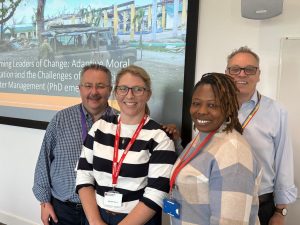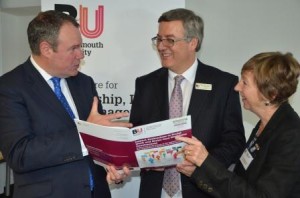 The AHRC’s Leadership Fellows scheme provides time for research leaders, or potential future research leaders, to undertake focused individual research alongside collaborative activities which have the potential to generate a transformative impact on their subject area and beyond. In addition to demonstrating support for high quality, world leading research and associated outputs, proposals must include collaborative activities to support the development of the Fellow’s capacity for research leadership in the arts and humanities.
The AHRC’s Leadership Fellows scheme provides time for research leaders, or potential future research leaders, to undertake focused individual research alongside collaborative activities which have the potential to generate a transformative impact on their subject area and beyond. In addition to demonstrating support for high quality, world leading research and associated outputs, proposals must include collaborative activities to support the development of the Fellow’s capacity for research leadership in the arts and humanities.
Leadership Fellows awards are supported as a partnership with Research Organisations. Applicants should discuss any potential application with their Research Organisation at an early stage, as strong evidence of institutional support for the proposed Fellow’s career and leadership development is required as part of the application process.
Applications to the scheme will be welcomed for research in any subject area within the AHRC’s remit. Proposals may be for research at a range of stages of development, provided that substantial high quality research outputs are planned to emerge directly from the Fellowship. A range of activities, including knowledge exchange, can be included in proposals and the scheme incorporates elements of the former Fellowships in the Creative and Performing Arts and Knowledge Transfer Fellowships schemes.
The scheme provides opportunities for mid and senior career researchers who meet the eligibility criteria outlined in the Funding Guide. There is a separate route to support applications from early career researchers with outstanding future leadership potential.
The Leadership Fellows scheme provides funding for a period of between 6 and 18 months. Proposals with a full economic cost of between £50,000 and £250,000 may be submitted.
Further details about changes to the scheme’s aims, eligibility requirements and assessment criteria are detailed in the Leadership Fellows Funding Guide (PDF, 1.2MB).
Public Policy Highlight Notice in the AHRC Leadership Fellows Scheme
AHRC is launching a highlight notice in its Leadership Fellows scheme as part of a range of activities to support the contribution which arts and humanities research can make to public policy.
The aim of the highlight notice is to encourage applications to the Leadership Fellows scheme which propose innovative ways to exercise leadership through engaging policy makers in their research, and explore the potential for impact in policy development. This can be in connection with any area of public policy.
Public policy in this context is understood broadly to include government at local, regional or national levels, as well as in connection with international governance bodies. Equally it covers the policies adopted by major civil society and third-sector organisations, such as major charities or charity partnerships, professional associations, etc, which effectively have a role in setting policy in areas which impact public life.
While proposals are welcome in any area of public policy, AHRC has been working with the Chief Scientific Advisors in Whitehall and devolved administrations to identify policy areas where input from arts and humanities researchers are particularly welcome. These areas, along with contact details for the Departments involved, are available in this Highlight Notice document (PDF, 157KB).
Closing Dates
Closing Date: 30/09/2016
The Leadership Fellows scheme does not operate under fixed deadlines. You may submit a proposal at any point during the year.
This highlight notice runs in the Leadership Fellows scheme until 30 September 2016.
Please note that the assessment process for applications submitted to the scheme (Standard and Early Career routes) takes approximately 30 weeks and the earliest start date for a project should be no earlier than 9 months after submission to the AHRC.
On occasions, there might be a delay in obtaining the peer reviews for an application and this may result in the assessment process taking longer. In such circumstances, the AHRC will contact the applicant to inform them of any delay.
How to make an application
For both routes of the Fellowships scheme you must submit an application through the cross-council Joint Electronic Submission – (JE-S) System. If you need any assistance to use the system, please contact the JE-S helpdesk by telephoning 01793 444164 or on JesHelp@rcuk.ac.uk.
If you are thinking of applying then you must contact your RKEO Funding Development Officer in the first instance.
Further Information
The Leadership Fellows scheme has its own Funding Guide (PDF, 1.2MB). This guidance should be used for applicants who open their Jes Application form from 1st May 2014.
Leadership and Peer Review College: Members of the Strategic Reviewer Group of the AHRC’s Peer Review College met in February at two separate meetings. One of the areas they discussed was leadership in the context of the Fellowship Scheme and a PDF has been produced to summarise their comments (PDF, 121KB).
Impact Summary and Pathways to Impact: – Frequently Asked Questions (PDF, 178KB)
RCUK Impact Requirements – Frequently Asked Questions
Examples of Impact from AHRC-funded projects (PDF, 296KB)
Support for Research Leadership
The AHRC has produced a film on Leadership in the Arts and Humanities which is available from the following page.



 The Science, Health, and Data Communications Research Group will be conducting a series of workshops to start off the new year, designed to help Bournemouth researchers form new networks and collaborative projects around educating and communicating research to the public.
The Science, Health, and Data Communications Research Group will be conducting a series of workshops to start off the new year, designed to help Bournemouth researchers form new networks and collaborative projects around educating and communicating research to the public. BU is preparing submissions for units of assessment (UOAs) for REF 2021. Preparation for each UOA is led by a UOA Leader who is supported by an Impact Champion and an Output Champion. From March 2018, UOA Leaders are recruited via an open and transparent process. All academic staff have the opportunity to put themselves forward for UOA Leader roles. The roles are until December 2020.
BU is preparing submissions for units of assessment (UOAs) for REF 2021. Preparation for each UOA is led by a UOA Leader who is supported by an Impact Champion and an Output Champion. From March 2018, UOA Leaders are recruited via an open and transparent process. All academic staff have the opportunity to put themselves forward for UOA Leader roles. The roles are until December 2020. The ESRC wishes to
The ESRC wishes to 













 Missing Persons Indicator Project Recruitment
Missing Persons Indicator Project Recruitment Celebrating our Research: Postgraduate Research Showcase 2026
Celebrating our Research: Postgraduate Research Showcase 2026 Nursing Research REF Impact in Nepal
Nursing Research REF Impact in Nepal Fourth INRC Symposium: From Clinical Applications to Neuro-Inspired Computation
Fourth INRC Symposium: From Clinical Applications to Neuro-Inspired Computation ESRC Festival of Social Science 2025 – Reflecting back and looking ahead to 2026
ESRC Festival of Social Science 2025 – Reflecting back and looking ahead to 2026 3C Event: Research Culture, Community & Cookies – Tuesday 13 January 10-11am
3C Event: Research Culture, Community & Cookies – Tuesday 13 January 10-11am ECR Funding Open Call: Research Culture & Community Grant – Application Deadline Friday 12 December
ECR Funding Open Call: Research Culture & Community Grant – Application Deadline Friday 12 December MSCA Postdoctoral Fellowships 2025 Call
MSCA Postdoctoral Fellowships 2025 Call ERC Advanced Grant 2025 Webinar
ERC Advanced Grant 2025 Webinar Horizon Europe Work Programme 2025 Published
Horizon Europe Work Programme 2025 Published Update on UKRO services
Update on UKRO services European research project exploring use of ‘virtual twins’ to better manage metabolic associated fatty liver disease
European research project exploring use of ‘virtual twins’ to better manage metabolic associated fatty liver disease